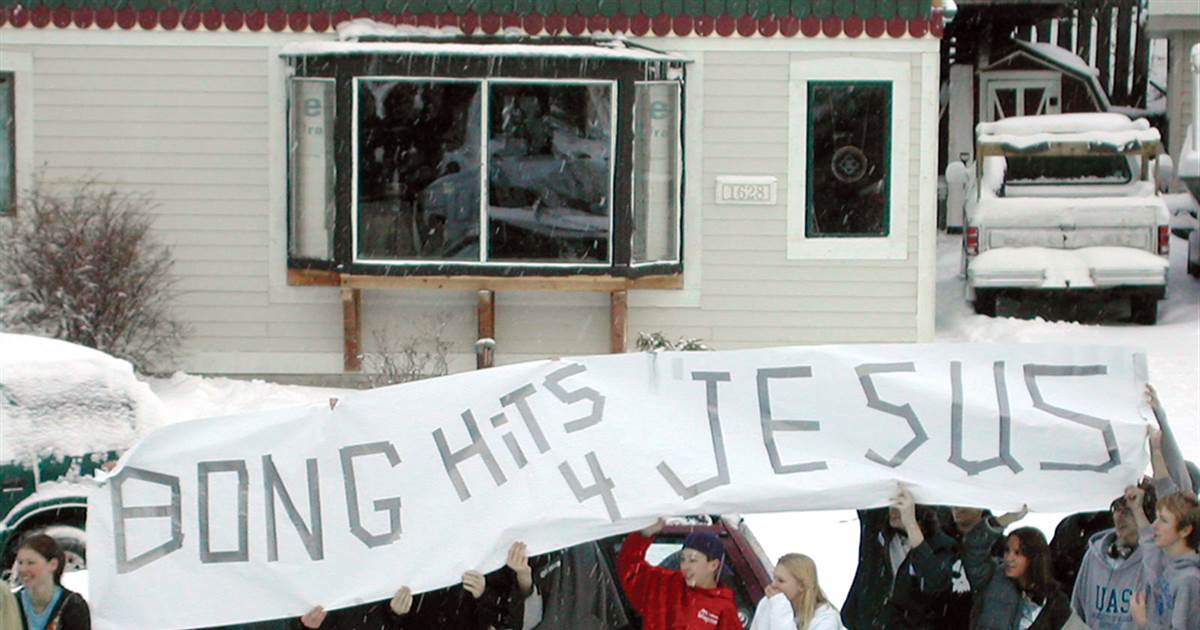Case Status: Loss. Supreme Court ruled that schools may restrict speech supporting illegal drug use.
Morse v. Frederick

CIR filed an amicus brief in this important free speech case concerning the authority of school officials to punish high school students for speech they deem contrary to the mission or work of the school, including off-campus speech.
The case concerned an Alaska high school that allowed students to leave school in order to observe an Olympic torch parade that was passing through Juneau. When the torch passed, Joseph Frederick unfurled a banner with the words “Bong Hits for Jesus” across the street from the school. His school suspended him for ten days. Frederick sued and late last year, the Ninth Circuit Court of Appeals ruled in his favor.
School officials, backed by the federal Drug Czar (and two former Drug Czars), contend that Joseph intended with his flippant speech to promote illegal drug use, which is contrary to the school’s basic educational mission. They asked the Supreme Court to broaden the circumstances under which a school can suppress speech. Under current Supreme Court precedent, a school may regulate the time, place, and manner of student expression. But it may not suppress speech based solely on its point of view unless it is obscene or clearly disruptive in some other way.
First Amendment Protection For Students
In recent years, however, schools have claimed that student expression of certain points of view is disruptive and tried to suppress it based solely on its content. Several years ago, a school district in New Jersey suspended a student for wearing a Jeff Foxworthy t-shirt that listed “Ten Reasons Why You Might Be a Redneck Sports Fan.” The vice principal decided the word “redneck” might cause disruption. CIR agreed to represent the student and won an important victory before the U.S. Court of Appeals, which ruled that school officials must have actual evidence of disruption before they punish a student solely for the content of his or her speech.
The Juneau school system asked the Supreme Court to broaden the idea of disruption to include not only messages that are actually disruptive but also messages that might conceivably disrupt the school’s ability to communicate its own messages — in other words, any message that registers an objection to school doctrine. In addition, the school wanted to extend the ability to school officials to suppress off-campus speech. In the school’s view, almost any form of off-campus expression would be subject to censor by school officials, including statements on personal web pages.
Under the Juneau Schools approach, schools would be free to define their “basic educational mission” any way they wanted. A school could decide that preventing obesity or reducing teen pregnancy was part of their basic educational mission and forbid speech deemed inimical to those objectives, including locker-room jokes or t-shirts promoting unhealthy foods.
CIR’s Brief
CIR’s brief urged the Court to leave current law in place, which permits schools to regulate the time, manner, and place of speech (including rules of civility) but does not permit schools to regulate the content of speech unless it is disruptive.
Unfortunately, the Supreme Court disagreed. In a majority opinion authored by Chief Justice Roberts, the Court ruled that school officials may regulate off-campus activities and may suppress pro-drug speech. Some commentators have suggested that the opinion may be limited to anti-drug speech and that student speech in other areas could enjoy more protection under the First Amendment.

